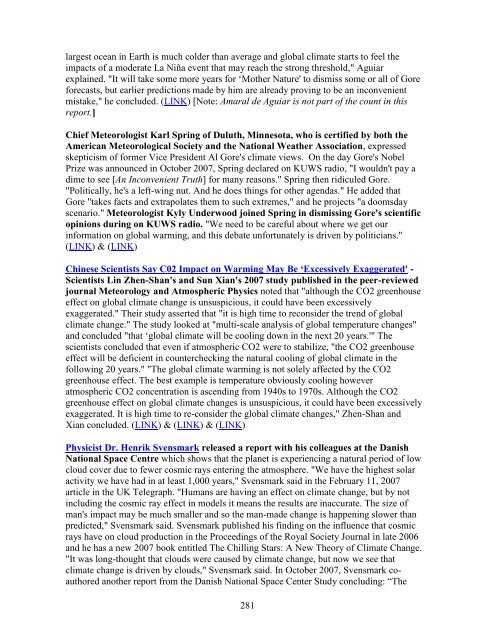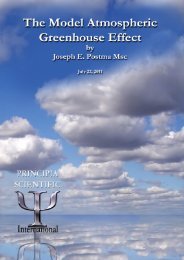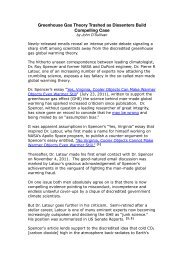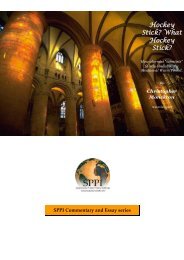Than 1000 International Scientists Dissent Over Man-Made Global ...
Than 1000 International Scientists Dissent Over Man-Made Global ...
Than 1000 International Scientists Dissent Over Man-Made Global ...
You also want an ePaper? Increase the reach of your titles
YUMPU automatically turns print PDFs into web optimized ePapers that Google loves.
largest ocean in Earth is much colder than average and global climate starts to feel the<br />
impacts of a moderate La Niña event that may reach the strong threshold," Aguiar<br />
explained. "It will take some more years for ‗Mother Nature' to dismiss some or all of Gore<br />
forecasts, but earlier predictions made by him are already proving to be an inconvenient<br />
mistake," he concluded. (LINK) [Note: Amaral de Aguiar is not part of the count in this<br />
report.]<br />
Chief Meteorologist Karl Spring of Duluth, Minnesota, who is certified by both the<br />
American Meteorological Society and the National Weather Association, expressed<br />
skepticism of former Vice President Al Gore's climate views. On the day Gore's Nobel<br />
Prize was announced in October 2007, Spring declared on KUWS radio, "I wouldn't pay a<br />
dime to see [An Inconvenient Truth] for many reasons." Spring then ridiculed Gore.<br />
"Politically, he's a left-wing nut. And he does things for other agendas." He added that<br />
Gore "takes facts and extrapolates them to such extremes," and he projects "a doomsday<br />
scenario." Meteorologist Kyly Underwood joined Spring in dismissing Gore's scientific<br />
opinions during on KUWS radio. "We need to be careful about where we get our<br />
information on global warming, and this debate unfortunately is driven by politicians."<br />
(LINK) & (LINK)<br />
Chinese <strong>Scientists</strong> Say C02 Impact on Warming May Be „Excessively Exaggerated' -<br />
<strong>Scientists</strong> Lin Zhen-Shan's and Sun Xian's 2007 study published in the peer-reviewed<br />
journal Meteorology and Atmospheric Physics noted that "although the CO2 greenhouse<br />
effect on global climate change is unsuspicious, it could have been excessively<br />
exaggerated." Their study asserted that "it is high time to reconsider the trend of global<br />
climate change." The study looked at "multi-scale analysis of global temperature changes"<br />
and concluded "that ‗global climate will be cooling down in the next 20 years.'" The<br />
scientists concluded that even if atmospheric CO2 were to stabilize, "the CO2 greenhouse<br />
effect will be deficient in counterchecking the natural cooling of global climate in the<br />
following 20 years." "The global climate warming is not solely affected by the CO2<br />
greenhouse effect. The best example is temperature obviously cooling however<br />
atmospheric CO2 concentration is ascending from 1940s to 1970s. Although the CO2<br />
greenhouse effect on global climate changes is unsuspicious, it could have been excessively<br />
exaggerated. It is high time to re-consider the global climate changes," Zhen-Shan and<br />
Xian concluded. (LINK) & (LINK) & (LINK)<br />
Physicist Dr. Henrik Svensmark released a report with his colleagues at the Danish<br />
National Space Centre which shows that the planet is experiencing a natural period of low<br />
cloud cover due to fewer cosmic rays entering the atmosphere. "We have the highest solar<br />
activity we have had in at least 1,000 years," Svensmark said in the February 11, 2007<br />
article in the UK Telegraph. "Humans are having an effect on climate change, but by not<br />
including the cosmic ray effect in models it means the results are inaccurate. The size of<br />
man's impact may be much smaller and so the man-made change is happening slower than<br />
predicted," Svensmark said. Svensmark published his finding on the influence that cosmic<br />
rays have on cloud production in the Proceedings of the Royal Society Journal in late 2006<br />
and he has a new 2007 book entitled The Chilling Stars: A New Theory of Climate Change.<br />
"It was long-thought that clouds were caused by climate change, but now we see that<br />
climate change is driven by clouds," Svensmark said. In October 2007, Svensmark coauthored<br />
another report from the Danish National Space Center Study concluding: ―The<br />
281





